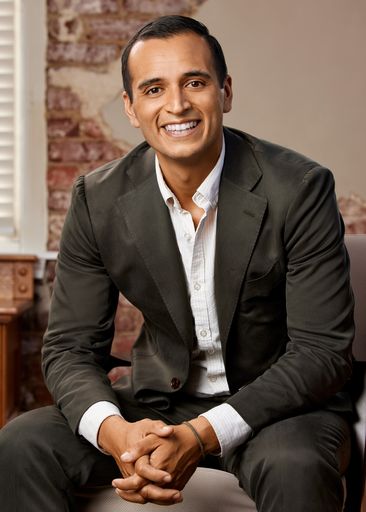Community Eye Care (CEC) is celebrating its 50th anniversary of providing vision screenings and comprehensive eyecare to communities. This year, the UAB School of Optometry (UABSO) is recognizing those who have helped CEC provide vision services to underserved and underrepresented communities as faculty, staff or as a student. With this in mind, meet former resident Mark Ortiz, OD.
Ortiz’s involvement with his childhood church helped to create a strong desire to volunteer and serve others. After completing his doctorate at The Ohio State College of Optometry, Ortiz moved to Birmingham in 2017 to complete his residency training in family practice optometry at UABSO. This background created the foundation for how he practices today. Ortiz currently practices at Georgia Vision Institute in Carrollton, GA.
Describe your past or present involvement with CEC.
I was first introduced to CEC by Dr. Janene Sims when I came to UAB. CEC has provided me with multiple avenues to serve during my career, such as the Western Health Center, PATH clinic, service clinics throughout the Black Belt region and multiple health screenings throughout Alabama. CEC also allowed me to contribute to programs such as the Gift of Sight and Remote Area Medical, a nonprofit that provides comprehensive care to those in need.
One of the biggest lessons I have learned from CEC is to adapt. You can turn almost anywhere into an exam lane with enough creativity! I have seen patients in schools, basements, hallways, churches and gymnasiums. One day, you may work with elementary students, and then you may be in a senior center. With CEC, you never know what a new day may bring.
Why are you passionate about serving underserved communities?
In my mid-twenties, I was diagnosed with stage three testicular cancer. After months of chemotherapy and multiple surgeries, I vividly remember the struggles of my day-to-day life. I went from being able to run a sub-three-hour marathon to barely being able to walk up a flight of stairs. Even though most people would view this as a mountain to overcome, and it was a challenge, I never felt more blessed. The love and support I felt from friends and family helped fuel me to overcome the obstacles put in front of me.
Going through such a personal struggle gave me a sense of empathy and a passion to help others. One of the things that draws me to serve is the gratitude I receive from helping those in need. As someone who has needed support, how could I not want to give back to others in similar situations?
How do you believe CEC has impacted underserved communities?
Without a doubt, CEC has made a tremendous impact throughout Alabama. Low-vision patients are disadvantaged in providing for themselves, their families, and their communities without proper healthcare and services. Everyday tasks become a struggle. Simply providing glasses to those in need can impact a patient’s overall quality of life.
Not only do we strive to help patients see, but also to keep them seeing well throughout their lifetime. Routine eye care is invaluable in the preservation of vision. Without a comprehensive eye exam, many individuals are unaware of their underlying ocular diseases. CEC helps to diagnose conditions such as cataracts, which cause preventable blindness in the community. Conditions such as glaucoma or macular degeneration, diseases that permanently damage vision, are routinely diagnosed and managed via CEC.
Another positive aspect of CEC is educating patients about their overall systemic health. The average person does not realize how intertwined their eyes are with the rest of their body. Through CEC, I have detected undiagnosed strokes, autoimmune diseases and tumors. People are often surprised to learn that their diabetes, thyroid disease or tobacco use can directly impact their eyes. By educating patients, we not only provide eye care but also help coordinate comprehensive care.
What is your most memorable CEC experience? Why?
One thing people often notice about my wardrobe is that I am a sucker for a fun pair of socks. I have one pair, given to me by my most memorable patient, that puts a smile on my face every time I wear them.
Over the course of my time working with CEC, I have diagnosed multiple patients with glaucoma. When evaluating one woman, it appeared that the disease was likely traumatic in origin. After asking her if she knew what may have caused the injury, she disclosed her recent domestic abuse struggles and her fight to lead a new life in a safe situation.
One of the things I love most about optometry is the ability to form relationships with patients. With this woman, in particular, being able to acknowledge her situation started her on a path towards healing. Over my time treating her, I was able to help with her glaucoma, and I also witnessed her persevere through her struggles and begin to thrive.
This patient is one of many I was able to form great personal relationships with due to CEC. So many of these patients require a lending hand, access to resources and an open heart. Providing this for so many patients through CEC taught me to strive toward always being there for those in need.
How has working with CEC impacted your life?
Something that I feel very strongly about is promoting a willingness to serve. CEC not only needs providers to give exams but also requires volunteers to coordinate patients, provide transportation, help with equipment and everything in between. During these programs, I have done everything from sweeping floors to serving sandwiches, not just asking which is better "one or two." Everyone is essential, and it helps put the "community" in Community Eye Care. An open heart to serve is something I hope to pass down to my patients, colleagues and my future son.
